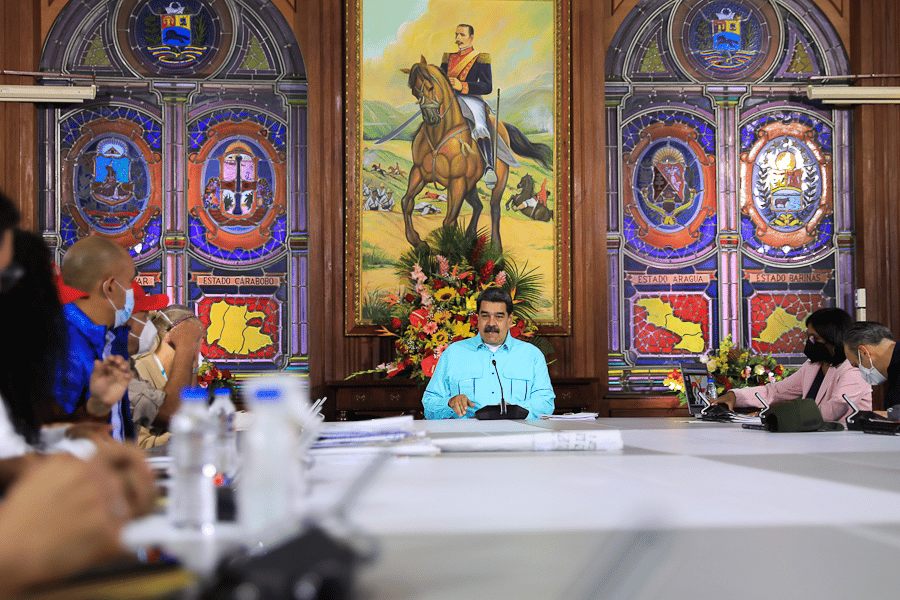
President Maduro during a meeting between PSUV leadership and cabinet vice-president held this Monday, September 5, 2022. Photo: Presidential Press.

Orinoco Tribune – News and opinion pieces about Venezuela and beyond
From Venezuela and made by Venezuelan Chavistas

President Maduro during a meeting between PSUV leadership and cabinet vice-president held this Monday, September 5, 2022. Photo: Presidential Press.
This Monday, September 5, Venezuela’s President Nicolás Maduro, commented that the result of the plebiscite that took place this Sunday in Chile, in which the majority voted against the new Constitution, was due to the fact that a grassroots, sovereign, and plenipotentiary process was not convened in Chile, because the government of Sebastián Piñera, former Chilean president, injected the process with limitations. In addition, “there was a lack of firm, clear, credible leadership that put itself at the forefront of the constitutional draft,” said Maduro during a meeting with the Council of Vice Presidents and the Political Bureau of the United Socialist Party of Venezuela (PSUV).
With the participation of more than 13 million Chileans, 61.87% of people voted to “Reject” the proposal for the new Constitution, drafted by the Constitutional Convention. The “Approve” option, on the other hand, received 38.13% of the votes. With this decision, the Magna Carta promulgated in 1980 during the military dictatorship of Augusto Pinochet will remain in force until a new text is drafted.
Chileans Reject New Constitution or Boric Government? (Early Results)
In this regard, the Venezuelan president described as “painful” the results of the referendum this Sunday.
However, he recalled that all the constituent processes that have been carried out in Latin America had strong leadership and a clear project. He recalled the processes that took place in Venezuela (1999), in Ecuador (2006), and in Bolivia (2007). “They had a national project and a clear offer of a better country, of a future, in a more democratic country,” Maduro said. “They had a coherent constitutional process. In our countries the right lied as much or more than in Chile, but the constitutional project was clear and had someone to defend it. It had a firm leadership, with popular support, like the leadership of Comandante Chávez in 1999, with Rafael Correa in Ecuador, or Evo Morales in Bolivia.”
“There was a clear, coherent project, and there was a clear, popular, democratic leadership,” Maduro said. “It was a grassroots process, unlike the Chilean one, which was not a grassroots popular process. They cut its wings from the old congress of (Sebastián) Piñera… Never in Chile was a grassroots, sovereign, plenipotentiary process convened. Its wings were clipped early. They filled it with limitations and in the end they called a constitutional convention.”
Some Important Aspects of the Proposed New Constitution of Chile
“In Chile they mediated the original Constituent Power that awoke from the social outbreak against the neoliberal model and Piñera in 2019. What a pain for the peoples of Latin America and the Caribbean!” said the Venezuelan president.
During the social outbreak of 2019, the protesters demanded that Chile’s president at the time, Sebastián Piñera, form a National Constituent Assembly for the drafting of a new Magna Carta. However, he called a Constitutional Convention, which was installed on July 4, 2021, with a period of one year to draft the legal text.
Similarly, President Maduro said that, in this constitutional process, “there was a lack of firm, clear, credible leadership that would put itself at the forefront of the constitutional draft.”
The Venezuelan head of state pointed out that, if there had been a clear project, absolutely popular, of radical change from neoliberalism, “another rooster would crow today and the Chilean people would be celebrating a great victory. All our solidarity with the people of Chile.”
“It is a defeat of the historical project, of the popular forces of the social outbreak, and this defeat will fall on the shoulders of those who mediated this farce,” added Maduro. “Sooner rather than later, as the great Salvador Allende said, this people will walk the great malls towards a true constituent, grassroots, plenipotentiary and sovereign popular process.”
Translation: Orinoco Tribune
OT/JRE/SL